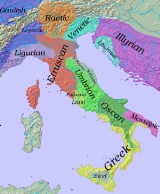
Aequian language
Encyclopedia
Aequian is an extinct language
presumed spoken by the people the Romans termed Aequi
and Aequicoli living in the Alban hills
of northeast Latium
and the central Apennines east of them during the early and middle Roman Republic
; that is, approximately from the 5th to the 3rd century BC, when they were defeated by the armies of Rome and were subsequently Romanized. As the area was heavily colonized by Latin speakers from Rome, most of the inscriptions from there are in Latin. Two undated inscriptions appear to be in a different dialect, termed Aequian by the scholars with the presumption that in fact they represent the language of the entire pre-Roman tribe. Not enough text survives to deduce any more than that it belonged to the Italic
branch of the Indo-European
language family.
The Inscription of Alba Fucus is a bronze plate inscribed with ALBSI PATRE. Conway reconstructs the first word as *albe(n)si, a dative case
. Baldi translates the text into Latin as Albano patri, two datives, and into English as "To the (god named) Alban Father."
The second document is the Inscription of Cliternia (Capradosso) in Petrella Salto
, an inscribed stone in a spring dissociated from context by nature (it rolled down a hill). The text is:
which is a notice stating that the road is private, passage by permission of Titus Umbrenus, son of Gaius, but beasts of burden are forbidden.
Extinct language
An extinct language is a language that no longer has any speakers., or that is no longer in current use. Extinct languages are sometimes contrasted with dead languages, which are still known and used in special contexts in written form, but not as ordinary spoken languages for everyday communication...
presumed spoken by the people the Romans termed Aequi
Aequi
thumb|300px|Location of the Aequi in central Italy.The Aequi were an ancient people of northeast Latium and the central Appennines of Italy who appear in the early history of ancient Rome. After a long struggle for independence from Rome they were defeated and substantial Roman colonies were...
and Aequicoli living in the Alban hills
Alban Hills
The Alban Hills are the site of a quiescent volcanic complex in Italy, located southeast of Rome and about north of Anzio.The dominant peak is Monte Cavo. There are two small calderas which contain lakes, Lago Albano and Lake Nemi...
of northeast Latium
Latium
Lazio is one of the 20 administrative regions of Italy, situated in the central peninsular section of the country. With about 5.7 million residents and a GDP of more than 170 billion euros, Lazio is the third most populated and the second richest region of Italy...
and the central Apennines east of them during the early and middle Roman Republic
Roman Republic
The Roman Republic was the period of the ancient Roman civilization where the government operated as a republic. It began with the overthrow of the Roman monarchy, traditionally dated around 508 BC, and its replacement by a government headed by two consuls, elected annually by the citizens and...
; that is, approximately from the 5th to the 3rd century BC, when they were defeated by the armies of Rome and were subsequently Romanized. As the area was heavily colonized by Latin speakers from Rome, most of the inscriptions from there are in Latin. Two undated inscriptions appear to be in a different dialect, termed Aequian by the scholars with the presumption that in fact they represent the language of the entire pre-Roman tribe. Not enough text survives to deduce any more than that it belonged to the Italic
Italic languages
The Italic subfamily is a member of the Indo-European language family. It includes the Romance languages derived from Latin , and a number of extinct languages of the Italian Peninsula, including Umbrian, Oscan, Faliscan, and Latin.In the past various definitions of "Italic" have prevailed...
branch of the Indo-European
Indo-European languages
The Indo-European languages are a family of several hundred related languages and dialects, including most major current languages of Europe, the Iranian plateau, and South Asia and also historically predominant in Anatolia...
language family.
Corpus
Aequian is scantily documented by two inscriptions. Conway's publication of Italic inscriptions adds a gloss, several place names and several dozen personal names, but it does not distinguish which of these are certainly endonyms and which are Latin exonyms in use by the Latin-speaking population. It is possible that they would have been the same in both cases, but such a hypothesis remains unproven.The Inscription of Alba Fucus is a bronze plate inscribed with ALBSI PATRE. Conway reconstructs the first word as *albe(n)si, a dative case
Dative case
The dative case is a grammatical case generally used to indicate the noun to whom something is given, as in "George gave Jamie a drink"....
. Baldi translates the text into Latin as Albano patri, two datives, and into English as "To the (god named) Alban Father."
The second document is the Inscription of Cliternia (Capradosso) in Petrella Salto
Petrella Salto
Petrella Salto is a comune in the Province of Rieti in the Italian region Latium, located about 60 km northeast of Rome and about 20 km southeast of Rieti.-External links:*...
, an inscribed stone in a spring dissociated from context by nature (it rolled down a hill). The text is:
- VIA INFERIOR | PRIVATAST | T VMBRENI C F |
- PRECARIO | ITVR | PECVS PLOSTRV | NIQVIS AGAT
which is a notice stating that the road is private, passage by permission of Titus Umbrenus, son of Gaius, but beasts of burden are forbidden.

